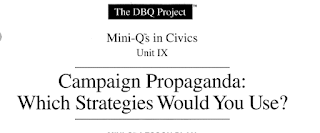Teaching early U.S. History during a presidential election year makes for endless past-present connections... IF one is looking for them. The middle school brain has an uncanny ability to segment information into discreet categories, never the twain shall meet! So teachers need to provide students with the catalyst to open the doors of those categorized boxes and let things mingle.
We recently finished our long journey down the Road to Revolution, past the Declaration of Independence, and arrived at our destination: The Treaty of Paris. We have less than three weeks until Spring Break, and a classroom full of tired kids. It doesn't seem like the time to jump into the Articles of Confederation, Shay's Rebellion, or the Making of the Constitution. Fortunately, we live in interesting times, and the C3 Framework gives us the structure to take advantage of it.
The C3 Framework includes a fourth dimension: Communicating Conclusions & Taking Informed Action as a way to communicate inquiry findings and connect to relevant democratic activities. Making a connection between the ideals of the Declaration of Independence and the presidential election campaigns seemed very timely. The students are hearing a lot about the candidates on the news and social media. They are beginning to form opinions about candidates of their choice (or their parents' choice, since they are easily influenced at this age). We decided to grab hold of that current event interest and end the unit with an Informed Action project.



Super Tuesday: We started our Informed Action with a casual, motivational investigation on Super Tuesday. We threw out this question: Should presidential candidates tell the truth while they are campaigning? Students generally agreed that they should, but they already knew that candidates didn't always stick to it. I directed them to look at two websites: PolitiFact and FactCheck.org. These two sites check the accuracy of statements made by candidates and others related to them (e.g., Super PACs). The students were very engaged, looking up candidates they supported, those they didn't support, learning about those who they didn't know much about, and noticing differences between them. They especially enjoyed finding out which statements rated as "Pants on Fire" (complete untruth) via PolitiFact. After about 20 minutes, I brought the discussion back to the group. I
asked them what they had found out, and several students shared
discoveries. I asked them the inquiry question again, and got pretty
much the same answer as the beginning of the class, so I flipped it
around a bit: Which candidate is the most truthful? (as of that day, it was John Kasich with Bernie Sanders a close second). Which candidate is the least truthful? (as of that day, it was Donald Trump by a long shot). Students also brought up questions about why the websites would fact check some statements and not others, whether we could trust these sites, and who was finding out about this information. Great critical citizenship!
Campaign Propaganda: Now that students had some sense of who the candidates were, we are turning our attention to campaign advertisements. The overarching inquiry question that connects back to past learning is What does "consent of the governed" and "alter and abolish government" look like? To start our inquiry, I showed a quick series of campaign ads from the previous week (found on P2016) and asked students to think about how they connected to the two ideals from the Declaration of Independence. They jotted ideas and questions on small slips of paper. We discussed afterward how the campaign ads were trying to persuade voters to give the candidates their "consent" to "alter" the government. The idea of "persuasion" led into the Mini-Q: Campaign Propaganda: Which Strategies Would You Use? Students investigate past presidential campaign ads to identify six propaganda strategies and evaluate them on how informative, effective, and ethical they are. Then they decide which three they would use to make a campaign ad. This builds student knowledge before we get into the project.
Public Service Announcement: It would make sense to have students make a campaign ad for the candidate of their choice at this point. However, we are holding off for now for two reasons: 1) We don't have enough time before spring break for the amount of research and production time they would need, and 2) Students don't have enough information about the electoral process yet to see how their candidate and their issues fit into the big picture. Instead, we are having our students make a Public Service Announcement (PSA) alerting citizens of propaganda techniques used in campaign ads. They will make a short movie/slidecast showing three campaign ads, identifying the propaganda technique the candidate used in each, and explaining how it is informative, effective, and ethical (or rather, how it is not those things). This fits into the role of informed citizenship, taking action for the greater good.
In the spring, after we teach the Constitution and the electoral college, we will have another presidential project, probably making an advertisement. By that time, students will have time to dig into issues, see where candidates stand on them, and consider which issues are most important to address in order to get the most electoral college votes. The number of candidates will have whittled down a bit as well.
In past years, we connected The Road to Revolution to The Arab Spring through the question: When is it necessary for citizens to rebel against their government? We did interesting projects with this as well. However, rolling with the times and student interest can make for a much more relevant investigation. It will not be too many more years before these 8th graders will be eligible to vote, and perhaps they will think back on their inquiry this year as they do, and wonder, "What should I know about this candidate before I vote for him/her?" This is informed action in the real world!


